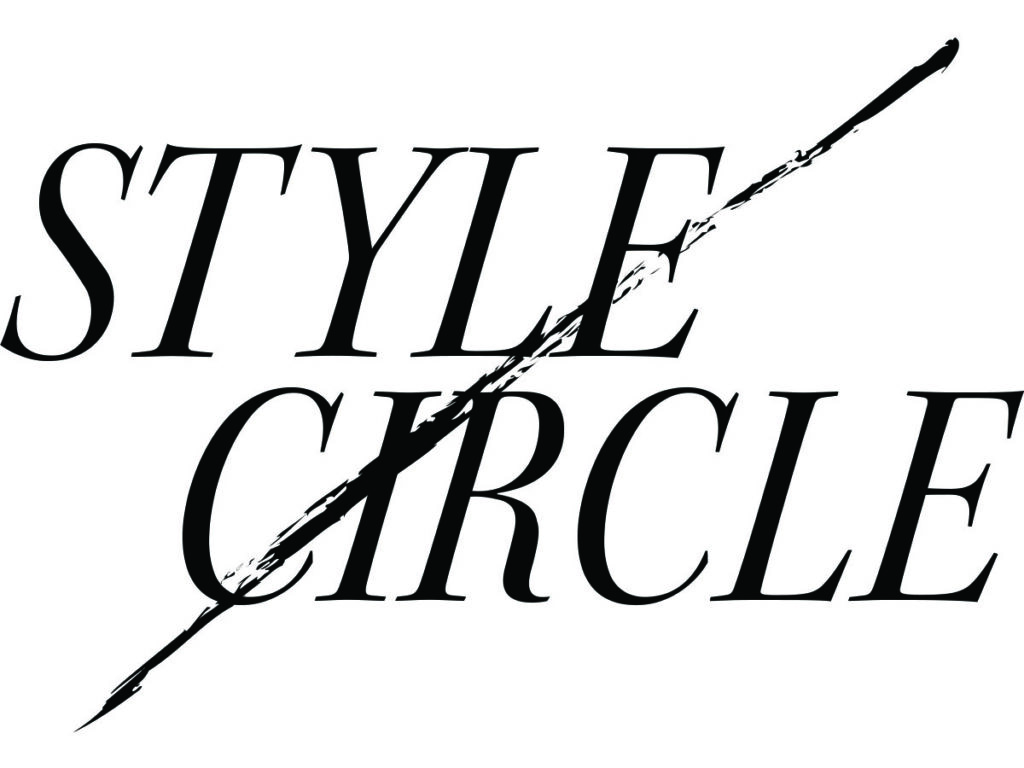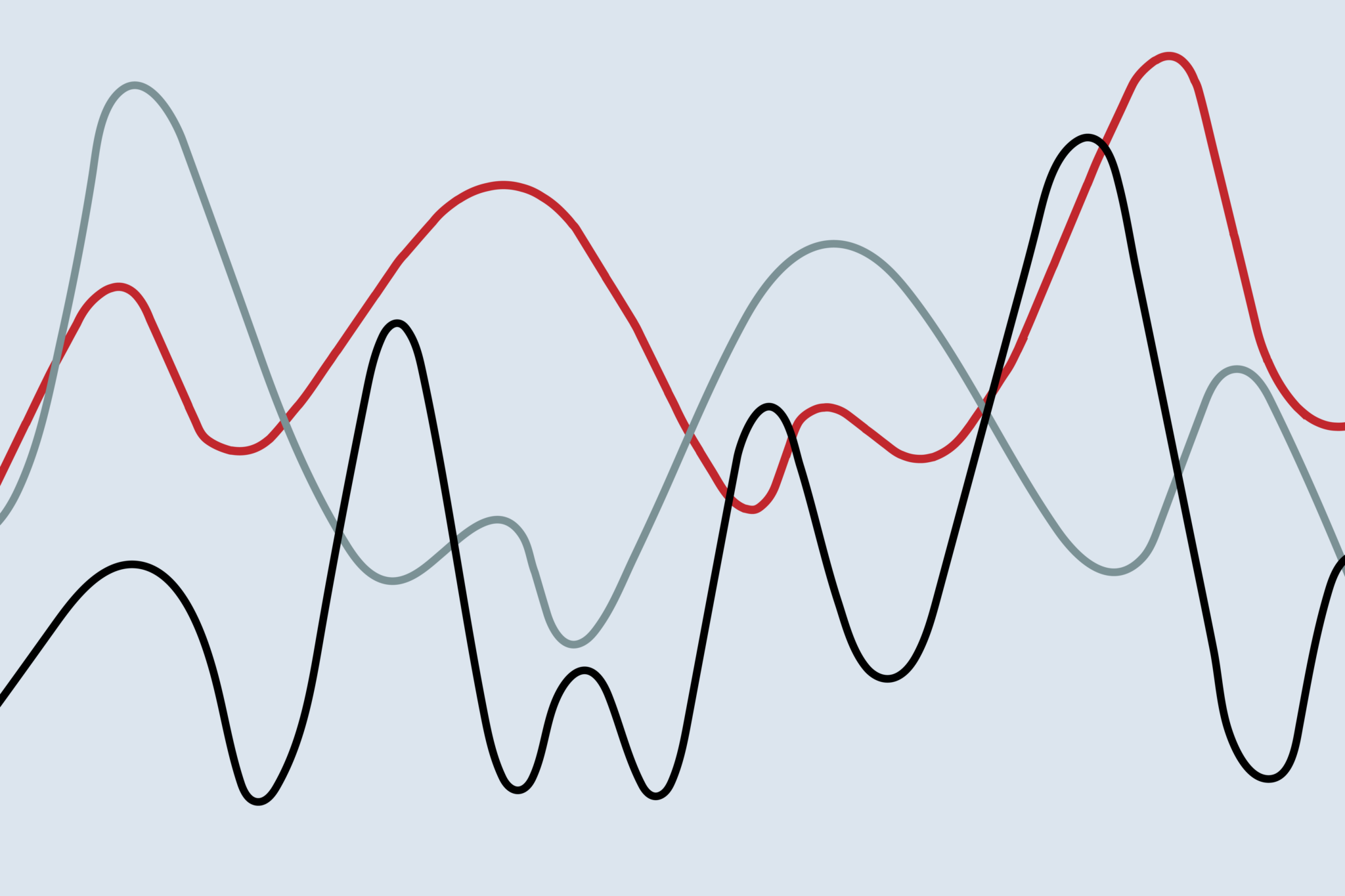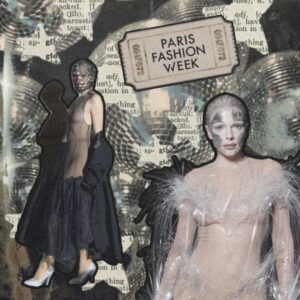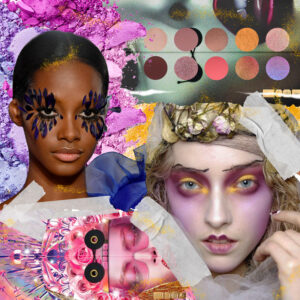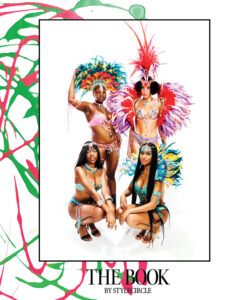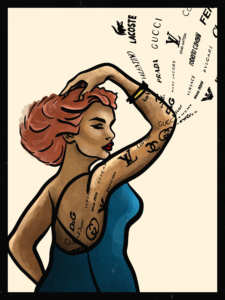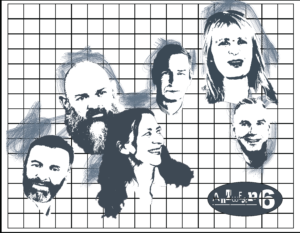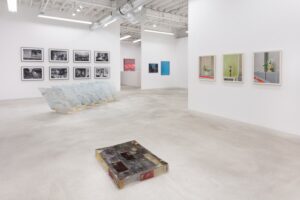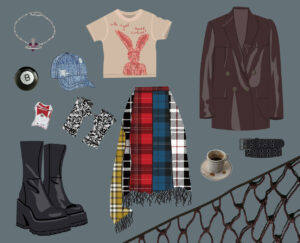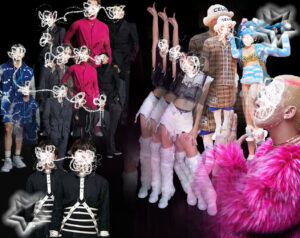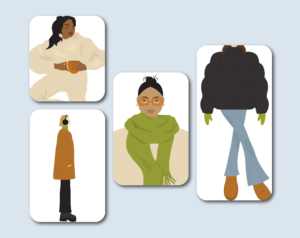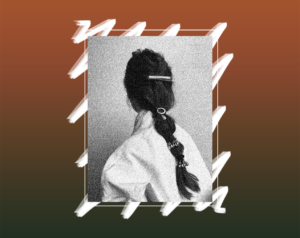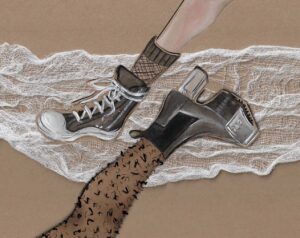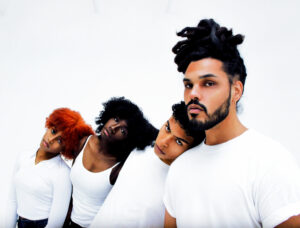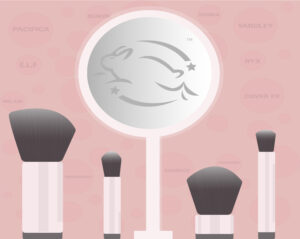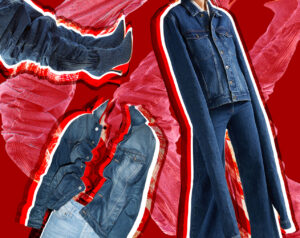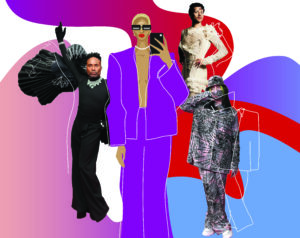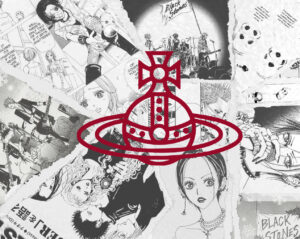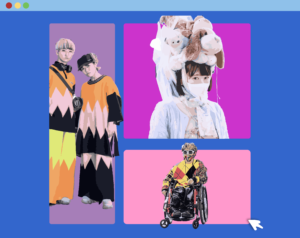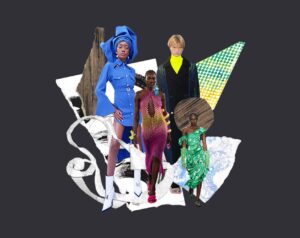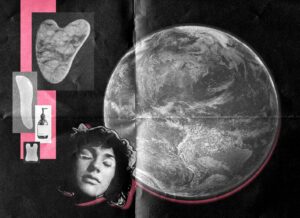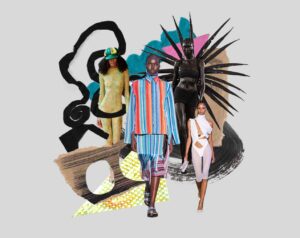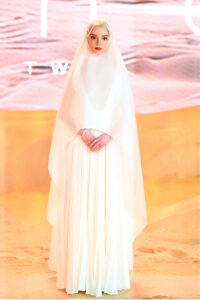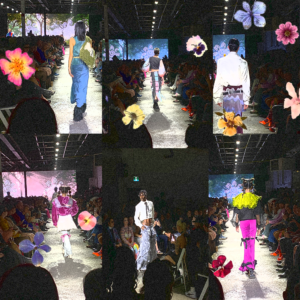This episode of The Podcast by StyleCircle was recorded in early December of 2020.
BELLA: Welcome to The Podcast by StyleCircle. My name is Bella, and I’m here with,
ARUSHI: Arushi,
BELLA: …and you’re listening to Episode 4 of The Podcast by StyleCircle.
The land where StyleCircle operates has an important history, present and future that we need to understand and acknowledge. This land is called Turtle Island, and it is originally the home of many Indigenous peoples. It is the unceded traditional territory of the Anishinaabe, the Haudenosaunee, the Wendat and the Mississaugas of the New Credit. We acknowledge and respect these nations as the past, present, and future true inhabitant people of this land. What is today known as Toronto is located in the Dish with One Spoon Territory. The Dish with One Spoon is a treaty between the Anishinaabe, Mississaugas and Haudenosaunee that bound them to share the territory and protect the land. We want to recognize that we are sharing this land on which Toronto sits with each other.
Intermission
BELLA: How are you Arushi?
ARUSHI: I’m good, how are you? In the middle of assignments, I’m sure.
BELLA: Uh, I actually handed in my final assignment today, so I just finished.
ARUSHI: Ah, ok, so yeah, I’m still, you know, trucking along until I’m all done.
BELLA: You haven’t been on a couple episodes and I’ve missed you.
ARUSHI: I’ve missed you too. Yeah, it’s been a while, it’s been like, almost over a month.
BELLA: Yeah.
ARUSHI: So, I might be a bit rusty, but excuse me. We’re going to have a good onversation today.
BELLA: Yeah, how’s your collection going if you have anything to say about that?
ARUSHI: Oh, yes, so, if you’re not aware, you listeners out there, I’m actually in my last year of the Ryerson fashion design program. I’m getting my collection right now currently and um, it’s been quite an experience doing it during quarantine, but um, it’s been difficult, but also really rewarding.
BELLA: So, we’ve actually found an article from 1 Granary talking about talking about how fashion students have been finding it increasingly difficult to find internships, obviously because of the pandemic, and obviously right now it’s a little bit troublesome, as you can imagine, to do getting jobs especially because Toronto is in a lockdown out again.
ARUSHI: Yeah, I actually did struggle with this in the beginning of the quarantine in March, because I still needed hours, and um, I was kind of just applying for everything I could find, but yeah, now I need less hours. I think what the question is, what—do institutions need to change what they’re doing, and is this affecting our quality of education really, or who needs to kind of change what’s happening here? So, I think the nice thing that’s happened is that the school has made some allowances, but I wonder how the industry is handling this, if, you know—does this affect how people are working?
BELLA: Yeah, and how is the industry exactly kind of adapting to having internships be online, and how they’re adapting to that whole process, I guess.
ARUSHI: So, I wonder how the industry is kind of adapting to the change in learning that we’re having, going from school to working, obviously right now, during this pandemic, we’re not having as much experience in the actual industry, so I wonder how that affects how students are looking for jobs and what the industry is looking for.
BELLA: Yeah, I know personally, it’s going to be an interesting experience moving forward, um, just trying to complete my own hours, and um, you know, wanting to get the adequate experience before graduating. Like, to feel like I am ready, I guess, to be in the industry. But yeah, so actually today, we’re going to be chatting with two recent alumni who actually went to Ryerson, and they were in the design program like Arushi, and they’ve actually started their own fashion brands.
ARUSHI: So, we’re speaking to Elisa Gentile and Sara Mirza. After completing her eveningwear collection, titled “Ama Rosa,” Elisa Gentile graduated in April 2019, starting her self-titled couture brand in the summer of the same year. She has since released a swimwear line, and a newest fall collection, titled “Ruhe,” debuted earlier this year, and is currently available to shop on her website. And we are also chatting with Sara Mirza, who has been designing collections since she was seventeen-years-old, and now, having finished the fashion design program at Ryerson in April 2020, she launched her self-titled brand earlier this year, specializing in high-end separates, often which are inspired by her Persian heritage. And her pieces are also available to shop on her online store as well.
BELLA: Okay, so when we come back from the break, we’re going to be chatting with Elisa.
Intermission
BELLA: Hi Elisa, how are you?
ELISA: Hi Isabella, I’m good, how are you?
BELLA: I’m doing good. Can you briefly describe your brand in a few sentences please, for the audience?
ELISA: Sure! My brand, titled Elisa Gentile, is a luxury brand specializing in couture ready-to-wear. The brand embodies a sense of individuality and creativity, with the emphasis of fashion. Through art and innovation, collections achieve an original style, which are true to my values, and I focus on craftsmanship, quality and fit throughout each piece. The brand embodies couture traditions with the demand of consumer needs, which is why its categorized as couture ready-to-wear, and as a slow fashion brand, pieces are made to order with the timeline that depends on the complexity of the garments.
ARUSHI: Nice, so, why is that important to you— that ready-to-wear piece – with the couture? Like, why do you feel that’s important to have made-to-order pieces?
ELISA: I think that because quality is such a big factor for me, I want to take my time with each piece and make sure that each customer gets a garment that fits them exactly how they want it, and I allow custom pieces too, so if customers want pieces in their size as well, I can make a pattern for them – with an additional cost, of course—and make the piece fit exactly to their body type.
ARUSHI: So, what can you tell us about your design philosophy?
ELISA: So, my design philosophy is all about intention an art. So, I always put intention into my work and make sure that what I’m putting out there is authentic. The work that I create stems from emotion and thought, which makes it very personal and also very fulfilling. I aspire to create pieces that can be looked at as an art form as well, but I push myself to make them as wearable and fashionable and functional as possible. And again, essential parts of my design are quality, so the technical skills and the craftsmanship are one of the main reasons why I love to design, so that’s a big part of my philosophy—making pieces that are just as beautiful on the inside as they are on the outside.
BELLA: So, what is usually your source of inspiration?
ELISA: My inspiration kind of comes from anywhere, which I feel like that sounds super cliché, but usually I start with an idea, or like, a certain topic, and I look at how that idea can be translated into art form. So, my process usually starts with a lot of research, and trying to dig deeper into this one idea or thought from a variety of perspectives. So, I read a lot of books and articles, listen to podcasts, and kind of consume myself with this one idea for a little while, to really understand how I can accurately represent it in a collection, or through a story, and then I’ll kind of move into the arts, which is like, usually visual art, or music and poetry, sometimes film too, and I don’t really look at that exact topic within the art, but more how I can piece together the ideas and thoughts from my topic into the feelings and tones within the art—if that makes sense.
ARUSHI: Alright, and I know that you travelled to Milan last year, where you kind of worked on your latest collection, so how did you gain inspiration, and how did that trip influence your newest collection, Ruhe?
ELISA: So, once I graduated, I knew I wanted to spend some time in Milan, it’s always been, like, kind of a dream of mine, so, in 2019, I made the decision to kind of move there, and my plan was to go there for a month and see all the industry, and hopefully land a job or an internship, and if I did, I would have stayed as long as I could. I ended up doing that for two months and I had some close calls with opportunity, but while I was there, I also had a creative spark, and I knew I wanted to come home and design and grow my brand with the intention of possibly going back one day. I don’t think I could have come up with my collection without that trip, because it was inspired by, kind of, everyday activities, and just being in the city itself, surrounded by all this art and culture and fashion. I think it really gave me a different perspective on the industry, and pushed me to want to do more, and also, it was essential in discovering who I want to be as a designer, and what my values hold in my place in the industry.
ARUSHI: And when you were in Milan, had you launched your brand yet?
ELISA: I—I had like, my Instagram, and I had my website with just my graduate collection, but I hadn’t fully started my business.
ARUSHI: So, Elisa, you have an intern at this moment, during quarantine.
ELISA: Yeah, I mean, she hasn’t come in for the past little while due to like, the lockdown, but I do give her some remote work and hopefully she’ll be coming back soon.
ARUSHI: That’s awesome—that’s good that you’re kind of contributing, you know, so you’re making adjustments, right, so I guess that speaks to what the industry is doing, you’re kind of changing it up as it goes, you know, and you’re adapting to the actual situation.
BELLA: Well I think that, like she said like, it’s a necessity to even run a business on your own is so much work, to have an extra pair of hands is so necessary, it’s kind of like you have to adjust, even if you don’t necessarily want to, you have to.
ELISA: Yeah, even just having like, an extra set of eyes can be good, cause sometimes you’re so caught up in your own stuff and you need a second opinion.
ARUSHI: Yeah, definitely. And even in the actual inspiration of your collection, you collaborated with Rue Graywall, who is an artist, for your Ruhe collection. So, what was that like?
ELISA: We’ve been good friends for a while, and I love art style, and I knew we worked well together. So, when I first went to her with the idea of creating a painting for my collection, I knew that we’d be able to, that we’d come up with a dream collaboration. Um, but I think it’s important to share your inspiration and your ideas with other people in the industry, and within other art forms, because for myself, like as a creative person, I’m always inspired by so many artists and so many other people’s work, so I think just like, feeding off each-other and collaborating—that whole process was essential in creating this one painting that we did.
ARUSHI: And I’m sure we’ve all kind of collaborated you know, in our school life, and even in our work lives, but what’s it like overall—over all that, you’re kind of like, in charge, right, of the brand. It’s your vision in the end, so what’s it like having all these people with your, but really, it’s your vision at the top?
ELISA: I am the type of person who likes to do everything, kind of, in my own way and by myself, so I don’t mind being in charge. It’s also empowering, I would say, kind of like to know that at the end of the day like, you get to build this brand and you get to kind of make all the decisions, obviously I always love hearing other peoples’ ideas and compromising and working together, but I also work best when I’m motivating myself, so that’s another reason why I want to start my own brand. So, I don’t feel too much of the stress of like, being in charge, I only have the one intern right now, but I guess the only downside would be like, always self-motivating and constantly pushing yourself when you’re the only one doing it.
ARUSHI: Yeah, I think we can definitely all relate to that as creatives, for sure.
BELLA: Yeah like, pushing your vision and keeping true to your vision, but also hearing other peoples’ ideas and remaining like—still trying to collaborate and hear other stuff, right?
ELISA: Yeah.
BELLA: What was the biggest challenge you faced in the early stages of launching you brand?
ELISA: I think when I first started, the biggest challenge was just finding my place in the industry and navigating what kind of designer I wanted to be, I knew what I loved to design, and I had so many ideas of like, what I wanted my brand to be like, but it was kind of hard for me to pick one focus and understand why certain things worked better than others, and I think that just comes with practice too, but originally like, my graduate collection was eveningwear, so I really wanted to like, start an eveningwear brand and go into that, but I had to kind of switch my focus and understand that there wasn’t much of a market for eveningwear, especially in Toronto, so that’s why I kind of transformed it to more of a ready-to-wear brand, keeping in mind of what the consumers need is always important.
ARUSHI: And so, I know your brand is very new, but I’m sure that challenges have kind of changed within a year or so, so what’s the biggest challenge now, today?
ELISA: Now, I think it’s more so deciding where to go from here, and how to like, keep my business steady at this time. I do, again, have like, so many different ideas and projects I want to put out, but I think that it’s just a matter of what is needed in the industry, and how I can keep my brand relevant, and also elevate my brand identity. And I think, in the early—like, I think—like I’m still in the early stages as well, so just making a name for myself and finding new ways of getting out there and kind of learning the ins and outs of social media and working on my website, like, all of that is—it’s a challenge but I also enjoy it.
ARUSHI: And going back to, you know, the early stages where you decided that eveningwear was not really what the industry needed, I’m sure that is kind of also coming out with other brands, you know, with COVID, is like, we’re kind of switching gears, so how is that—how has this pandemic affected your work?
ARUSHI: it’s definitely impacted my work in a variety of ways, but like I said, without the time that I did have at the beginning of the pandemic, I don’t think I would have started my brand, but I do agree that you kind of have to like, switch your mindset and kind of navigate towards what is needed right now, in a time where like, people aren’t really buying clothes.
ARUSHI: Yeah, and you hosted a pop-up, right, during this time in October, so how was that with all the restrictions and everything, how did it go?
ELISA: It went well, there were definitely challenges, a lot of people that I hoped could make it weren’t able to because of COVID and because of the limits of how many people could view the space and the collection all at once, it was definitely difficult, and it was my first pop-up, so that was challenging itself. But the turnout was still good, and I was hesitant on doing anything for the collection like, originally, I wanted to do a show, even, but I decided on going with a pop-up because of the pandemic.
ARUSHI: Yeah, I actually wanted to come to that pop-up but just because of—it was really difficult to travel, for me. I’m a bit far away from the city, so I wasn’t able to come, but it was nice to see other profs, the professors at the university—sorry, at Ryerson—that were coming out to support you, that was really cool, and you were getting features with other, you know, like, networking agencies and all of this who were kind of putting out videos of your pop-up. That was really nice, and um, but can you speak to, kind of, the whole thing about having fashion shows during this time? Do you think it’s still relevant?
ARUSHI: I think its relevant for, as a creative inspiration and a creative outlet, but with everything going on right now I think people have to find new ways of doing it, but for me, I was just happy to like host something that creatives could come into and kind of view art and have a conversation about art and fashion and the state of the world, because everyone also misses that interaction. So as much as it’s important to stay home and think of new ways of doing things, its also important to stay creative and figure out how we can kind of push the conversation, if that makes sense.
ARUSHI: Yeah, and you also released a fashion film, during this time, for your collection, so do you think you—if this pandemic wasn’t going on right now, would you have made a film still, or would you have just done a show?
ELISA: I think I probably wouldn’t have to be honest, because I knew I always wanted to do a film, but I didn’t think I would do it this early into my career. But I think that’s a good point too, that without the pandemic, my film, which I’m very proud of, I’m happy that I did it, it wouldn’t have happened.
ARUSHI: It was absolutely beautiful, all you listeners out there, this is fashion film, and even like you’re saying, you’re still new to having your own brand, but it’s so well-done. It’s just like, a couple minutes, but it’s beautiful. So kudos to you.
ELISA: Thank you! Yeah I was lucky to work with a lot of my friends too and people that I knew, and I think that’s important, when you’re collaborating, to completely understand each-other’s vision, and be comfortable.
ARUSHI: And it’s such a better way to kind of showcase I think your abilities and you can kind of perfect everything shown and have all these people collaborate with you and it’s just a nice way where it doesn’t end quickly, with a show, I think you can show every detail and really zoom in on the best parts of the collection.
ELISA: That’s true, and I like the inclusivity with the video as well, like sometimes fashion shows are so elite and so exclusive that not everyone’s able to view them. With a show you can just kind of—sorry—with a film you can kind of just put it out there, and if people want to watch, they get a chance to see your work.
BELLA: Thank you so much Elisa for joining us today and discussing your collection in such detail, it was really informational. We’re actually going to talk to you again in about 15 minutes after the break were going to be talking to Sara about her own brand and her collection.
Intermission
ARUSHI: Alright, so we’re back now with Sara Mirza who finished the Ryerson fashion design program this year in April, so how are you Sara?
SARA: I’m very good, how are you? Thanks for having me.
ARUSHI: We’re good, thank you for chatting with us today! So, could you briefly describe your brand in just a few sentences for us?
SARA: Yeah, absolutely! So, we are a Toronto-based fashion house. We specially in evening gowns and our specialized coats at the moment, mostly towards luxury ready-to-wear womenswear at the moment, but I’m hoping to expand into menswear in the future as well.
BELLA: Awesome! what is your design philosophy?
SARA: I come from a background that I was really interested in writing, previously, before I decided that I wanted to become a fashion designer. So, to start the designing process, I always have this little notebook that I take with me everywhere that I go, so, I started writing poems describing this astonishing woman that I’m envisioning, and she’s wearing this killer outfit and I kind of take it from there, so basically every outfit that I design within a collection has its own poem, which is often narrated in the third person who is watching her in admiration and kind of like, looking at her as she’s going by in the street or in a party or something, and that’s how I kind of like, create the narrative, and from there I develop it into a collection.
ARUSHI: That’s so cool, you have like, an invisible muse.
S: Yeah, exactly!
ARUSHI: That’s interesting!
SARA: Like, a thousand invisible muses.
BELLA: Yeah, so it’s kind of like, I guess, your source of inspiration comes from words, which is super interesting, because a lot of the time, it comes from visuals. Can you describe that a little bit more? That’s so interesting.
SARA: Yeah, absolutely, so um, I would say like, my parents always used to take me to like, different art galleries and museums during the weekends, so it’s kind of like it’s part of who I am. So, whenever I have free time—not anymore, because of the pandemic—I’m always walking around in the city and just going and looking at different independent art galleries and museums, and like I said, I have my like, little notebook with me, so I’m just like, walking around the city, or in nature, and I just see something, a piece of work—even a woman in a bus or something—that I just see her and I get this idea that comes to my mind and I just start writing about her and trying to create this parallel universe that she’s in, or just trying to like, take that woman that I saw on the bus and be like, okay, so if she was going to this certain event, what would she be wearing? And kind of like, take it from there. And also, because of my cultural background like, poetry is very essential for Persian culture in general, and when you’re growing up, there’s so many celebrational—or traditional celebrations that’s like, involved with poetry, and you just like, gather around with your family and you just read poetry and poems and kind of like, that’s how it’s like, embedded in who I am, so I’m really glad that I could combine that with my fashion sense.
ARUSHI: Awesome, so, with all of this inspiration, when did you decide that you wanted to start your own brand?
SARA: I actually started really early. So, my first collection, I produced that when I was seventeen, and I asked my best-friend to be my model, so I photographed her and everything, and then that’s actually what I submitted for my application portfolio when I was applying for Ryerson. And then I kind of like, did that, and took it aside for a while, I started university, I was a first-year, I was panicking, wasn’t really thinking about how I was going to do my brand, but then after my second year, I travelled back to Iran, and then while I was there during the summer, I was introduced to this really well-known designer, and she’d just got back from London, she was a graduate of Central-Saint Martins, and she saw my first collection and she really took interest in my work, and she kind of like, she basically mentored me to creating my own brand, just further focusing on my own thing. But even though that she literally mentored me, kind of like saying like, this is how you approach your customers, this is how you approach production and everything, she kind of like, gave me the confidence of like, I can do this on my own. Because when you’re a young designer and you want to start your own thing, you’re so scared, like “Am I good enough, is my design aesthetic what the customer wants, am I creating new for people out there?” And the fact that I knew her and I knew that she was really successful and she was this empowered woman who went after what she wanted and she was really successful and she believed in me, and believed in my aesthetic, was kind of like, the most important thing to get me started. And after that, yeah, kind of like, I developed more collections, and by the end of that summer, I had my second collection carried in independent clothing stores throughout the Middle-East, which was really exciting.
ARUSHI: Awesome, so, you said you’ve collaborated with mentors and you’ve had models—your friends as models—so, who else is involved in your brand right now?
SARA: I have two very lovely interns who joined the company as of the beginning of this pandemic, they’ve been great, I’m so grateful for them, even though I haven’t seen them in person—we couldn’t really meet up—but we’ve been connecting through Zoom and I, just like Elisa said, we give them assignments and we kind of like, work together, and they’ve been mostly focused on like, the research and like, the PR section of the brand. And I do also have like, production teams throughout the Middle-East, like mainly Turkey and Iran, and those are also like, involved within the brand, and also my brother, which has been helping me as well—that’s kind of like the whole team behind Sara Mirza.
ARUSHI: Nice! And you co-founded your brand with your brother, right?
SARA: Yeah, I did.
ARUSHI: So, what’s the dynamic like between you guys?
SARA: Honestly, like, working with close family members, it’s not that easy, but I’ve been so lucky because my brother, he’s actually a lot older than me—he’s ten years older—he also has a background in business and banking and finance, so he was like, bringing this perspective that is completely different from being a creative person, and I think that’s really crucial for anyone that wants to start their own thing, because we’re designers, and we really don’t know a lot more about like, the business side of it, and unfortunately, that’s a part of having your own brand, is as much as you want to be more focused on the artistic section of it, someone needs to mentor you and help you with the business side, and the marketing, and how to like, actually finance everything, if you’re trying to create a business, right? So yeah, I’ve been so lucky to have him helping me and mentoring me, but like, it’s hard. We’re not afraid to call each other out and disagree, but it’s been great so far.
BELLA: That’s so cool that you work with your brother like that. I don’t know if I could do that. I don’t have a brother, but I have two sisters, and I don’t know if I could do that.
SARA: I totally get that!
BELLA: So, I know you mentioned that you dropped your first collection when you were seventeen, and you started your brand with your brother, but how old were you when you kind of started getting more interested in fashion?
SARA: I was exactly nineteen years old when I started doing this seriously like, I created my second collection with that mentor I mentioned earlier, and she kind of introduced me to retailers in the Middle-East and kind of like, connected me to them, and that’s how they got to know my like, my collections and who I was as a designer, and that was really scary because I was really young, and I didn’t really have that much of a confidence, and I wasn’t that confident in who I was as an artist, but I think you will never be really ready the way that you think you would be, you just have to believe in your aesthetic and just go for it if you think that this is what you want to do. So, I would say nineteen is definitely when everything got like, seriously started for me.
ARUSHI: So, what is it like at this point in your career, in your brand—to be the—to be in charge of everything?
SARA: It’s been great, especially if you’re a designer and you have a very clear vision of what you want to do. Being in charge is really helpful because you can just design what is it that you like to do, but at the same time, it’s a lot of responsibility and it’s really stressful, it has like, stressful moments, but overall, like I said, you need to believe in yourself and believe in your aesthetic, and just try not to really, it’s important to listen to other people, especially your customers, but you really shouldn’t let the market dictate what you should do, especially when you’re starting out, because you know like, if there’s like, a trend, you need to figure out what that is and you need to be somewhat onboard with it, but if you’re really trying to like, mimic what is going on in the industry at the moment and trying to just really bend yourself to what the industry wants you to be, you kind of lose your sense of authenticity. So, it’s really important to like, try to watch out for that, especially when you’re starting out.
ARUSHI: I agree, I think it’s important to, at the beginning kind of say that this is the kind of designer that I am, right? Is that what you’re saying?
SARA: Yeah, exactly, yeah!
ARUSHI: And you need to have a clear, you know, image of what your brand is providing, and then later I think it’s common for designers to get more experimental, I think, but I lie what you’re saying is that at the very start, you need to be almost narrow-minded and stick to your vision, and then when you’ve kind of found a bit of success, you can kind of expand, is that what you’re saying?
SARA: Yeah, so, I think for any creative individual like, it takes time for people to understand your work and understand what is it that you do, and you really need to allow yourself to go through that time and just, over time, you’re going to find your audience, you know? Don’t be scared if no one’s like, getting what you’re doing at the beginning, or it’s not like, you know like, getting out there as much as you think that it would, and your story is not getting out there as much as you thought, but like, really, like, fashion brands need to allow their customers and people to understand their story, and brand awareness doesn’t happen overnight. You need to build that relationship over time. You need to build that reputation and your story.
ARUSHI: So, what would you say at the beginning of you finding yourself and your brand, what were the biggest challenges?
SARA: I think the first thing is figuring out that one specific design focus and aesthetic that is unique to you, and what your place is in the industry, and then from there, how do you actually make your vision come to life? How do you work with other people? How do you work with wholesalers, with production teams? How are you going to reach out to your customers? What channels are you going to use to get your story out there? It’s all the things that you need to figure out, and at the same time, the fact that like, a lot of entrepreneurs, it’s just you like a one-woman show, so you have to be so active all the time and trying to figure out everything by yourself. So, yeah, it’s great to collaborate with friends and people that you know within your circle and around you. You’d be surprised at how many talented people that you know through school and through your friends—and that’s when you start! You don’t need to go out there and find this amazing person that like…I was so lucky to have this mentor, I found her by chance, but you’d be surprised sometimes like how many people, how many talented people you can find within your group of friends.
ARUSHI: And so, at this point, what would you say is the biggest challenge today, after you’ve had all this experience?
SARA: So, this year has been really tough for anyone who has had a business, and what you do is just try and adapt as much as you can, and you try to communicate with you customers as much as possible, and I think for me, it was connecting with everyone through social media and online platforms. We’re actually planning on having a pop-up shop in Yorkville, but that got cancelled because we went into lockdown, and I was really looking forward to that because when you’re starting out, you want people to see your designs in person, see the quality and craftsmanship that goes to it, because you can’t really communicate that through just pictures on social media, right? You need to feel it, you need to wear it, and I think the biggest challenge was just communicating with your audience, and trying to adapt to all the changes that were happening so rapidly in our personal lives, and professional lives too.
ARUSHI: So, what you’re saying about having to feel the quality and the craftsmanship, which I totally understand, how do you think that’s going to be solve right now, within the industry, as people can’t see things in person?
SARA: Yeah, so I think the best thing you can do is like do everything in your power to try to show your customers, what is it that you do, and how it’s made, and just like take as many pictures and information as you can and put it on your website so they’re really informed, and try to just be as transparent as possible with them. So have one design worn by different models with different body types, have a very detailed sizing chart on your website, have little videos and try to communicate that feeling and that quality to your customers as much as possible.
BELLA: So, how has COVID impacted your designs, at all?
SARA: So, I think COVID has really impacted what I’m doing at the moment, but at the same time, I’m really utilizing this time to focus on like, future projects and like, I’ve been journaling a lot, so for the next collections I have all these ideas that are coming to me and really focusing on that, and just trying to stay connected with people and my customers as much as possible, and kind of just focusing on building that brand awareness, you know, like, I’m sure all of you know like, people aren’t really buying a lot of products right now, so you can really utilize this time to get your story out there, you know, like, it’s not about just pushing something to the customer, you know, it’s about the story, it’s about the reputation. You have to see what is it that you can do at the moment and try to focus on that.
ARUSHI: So, I want to go back to a few minutes ago, you said that, you know, at this time, you have less time, with the pandemic, which I think is really interesting because I think a lot of people right now have found more time. So, can you kind of speak to why you have less time now, just kind of doing nothing, or what are you doing that’s filling up your time so much? Tell us.
SARA: I’ve been really…I think it’s mostly because I was so busy with school and work for the past four years that I really didn’t get to have that freedom to just really search and explore the ideas that I had. While I was in Ryerson like, anyone who’s in design knows how hectic the program can be, and then right after that, I would finish and at the beginning of summer I would just focus on the collections and all of that, so I really didn’t…I was just constantly working. So, when the pandemic started, I just really had the time to breath, and then I got started at planning on what I want to do next, and I think it’s a really good time for anyone who has an idea that they want to focus on after everything is back to normal, to just really plan your steps; everything’s quiet, no one is really doing a lot of things, so you can really just focus on your vision and figure out what your next step is going to be after everything’s over. I’ve been journaling a lot, I’ve been reading a lot—Masterclass, I definitely suggest that for everyone, to get it—yeah, that’s what I’ve been doing, it’s been great, I’ve been trying to myself keep busy as much as possible.
ARUSHI: That’s awesome, so you’re using this time to kind of build on your skills.
SARA: Exactly!
ARUSHI: But you’re not feeling any pressure to make different product at all, or execute things differently, you’re kind of just sticking to your vision. Is that right?
SARA: Yeah, so I think the battle between like feeling pressure to do something as an artist is always there, and I’ve been struggling with that ever since I started my journey as a fashion designer, but over time, you build that confidence to trust your vision and trust your own plan, and you need to understand that ever single designer and every brand has their own journey, and what has worked for someone else might not work for you. So, believe in what you want to do, and do your research—go do it, go after it, and don’t overthink it all the time.
BELLA: Alright, well thank you so much Sara for joining us, after this short break we’re going to be talking with both Sara and Elisa about their university to real-world journey.
Intermission
BELLA: And we’re back with both Sara and Elisa. Since you both graduated both one year apart, you must have some shared school experiences. Can you guys speak to any of that?
SARA: Oh my god, where do we even begin? I think what everyone can relate to is working late, late nights in the labs, and just like trying to make it to the deadlines and all of that, right Elisa?
ELISA: Yeah, I think just, we were just saying too like, being all together in the labs like, everyone’s trying to finish their projects like, those times, you don’t think you’d miss them as much as you do once you’re done school. You think you’re like, going to be free and you’re not even going to look back, but looking back, you kind of miss working with everyone and staying on top of these deadlines together.
ARUSHI: So, what can you say has changed since you finished at Ryerson like, generally, first of all, what’s different?
ELISA: I think your outlook kind of changes on the industry as a whole, even just finding your own voice as a designer changes. Ryerson is so good for like, the fundamentals and all the learning, but I’ve enjoyed kind of finding my own place and learning for myself about what kind of designer I want to be, or what the industry’s lacking, and how I can bring my own voice to the table.
SARA: Yeah, exactly like, I think Ryerson is a very technical school in general like, you’re really focused on figuring out how to make things and how sewing and construction and pattern drafting works, and after that you kind of like, have to utilize everything you’ve learned throughout the four years and kind of like, unintentionally try to combine it into finding your next steps.
ARUSHI: Yeah, so as I’m currently in the program, I’ve also heard this about Ryerson, I’m sure everyone has, that our program specifically is more technical and you know, focused on the actual construction of the garments, so do you think now you guys kind of…how are you with the creative piece? Do you feel that having all these technical skills is better, or how—has that hindered you? Or how do you think of it?
SARA: I think it’s both. If, as a designer, you want to start your own brand, or just, you know, getting a job in the industry, you need to understand how construction works on a high level, because you need to understand, how can I use this fabric on a body so she can actually move, or is this crazy idea that I have is actually like, physically possible. So, it’s really important to know that, but at the same time, you can even utilize your time while you’re at Ryerson like, I’ve been doing a business minor while I was at Ryerson, because I knew that fashion design is really focused on the creative side, and I need to know how marketing works, how starting a business works, so I kind of did that on my own, and I think a lot of other student while I was at Ryerson did that like, a lot of my friends did minors and that’s something I would suggest to any other Ryerson students at the moment. If you have the time and you’re interested, do minors, do research on your own.
ARUSHI: Yeah, I’m actually doing an entrepreneurship minor at the moment, so I definitely agree with you.
SARA: Amazing!
ARUSHI: Elisa, what about you?
ELISA: Yeah, I agree as well. As technical as Ryerson is, I think it’s important to also expand your creative side, because sometimes you don’t always get that chance when you’re in school. So, I think it’s important to keep just staying creative and really trying to push your designs, while keeping the technical aspects there.
BELLA: Yeah, for sure. So, I’m sure we’ve all heard the debate on whether post-secondary is really necessary to pursue fashion design and fashion comm, I’ve heard the debate on my side as well. Why was it important for you two to get degrees in order to pursue your design?
ELISA: I think, for me like, I’m the type of person that I kind of like to learn everything and know everything before I get into it, so I think I needed the fundamentals, and again like, the technical aspects of it, to really know that this is what I wanted to do and what I could do. And I think at the time, I graduated—I went to university straight from high school, so graduating high school, there was nothing I wanted to do more than fashion design, so that Ryerson and university for fashion design in general was just like, my first option.
SARA: Yeah, I think for me, like you said, I went to university right after I graduated from high school, and if you really want, if you’re really serious about something and know that this is what you want to do, it’s never going to hurt to just study it on a professional level, and just in general like, being in a university environment, you just learn so much about not just that one specific program that you’re studying, but society and how everything else works, and you kind of become educated in so many different areas, whether intentionally or unintentionally. And yeah, I think it’s just really important to focus on something on a professional level, as well as just being on your own, and since you’re like, being just graduated from high school, you’re like, really young, so a lot of times you don’t know that what is it that you want to do, so university gives you that space to try to like figure out who you are, and where do you want to go after that.
ARUSHI: And since the two of you graduated, has the way that you actually design and your process and your thoughts, has any of that changed?
SARA: Yeah, so, actually I think it’s…you’re always evolving as a designer, and I’m sure everyone’s going to relate to this that, if you look at your designs in first-year, you’re going to be like, “What was I thinking?” That’s actually a good thing because you’re always evolving, and you’re always learning, and you’re actually changing because of that. I don’t think that your design principles and principal design aesthetic really changes that drastically; I remember while I was in school, throughout all years I was like—my friends were like, — “if I saw that one design from a mile away, I would say it was your work, even though that they are all different,” and I think that’s true for any other designer too but like, you’re always trying to take that to the next level. It might be like, a really, really slow process, but you are definitely changing, for sure.
ARUSHI: And so, what are the feelings that you guys have experienced from going from school to the actual industry?
SARA: To transit from Ryerson and university in general to going out there, because we both went to university straight from high school, so ever since you can remember, you have been a student, and that has been your main identity—one of your main things that you identify with, and after that, you’re kind of like, “Okay, now what?” And I think you shouldn’t be scared of that, and you shouldn’t think that you’re alone. Everyone’s trying to figure out what’s next for them, and these are really unusual times because of the pandemic, so don’t be hard on yourself, really give yourself that space to breath and really think about what you want to do next, not falling behind—if you want to take an extra semester, that’s totally fine. When you’re in your forties, saying you’re well into your professional career, it’s not going to matter if you graduated at twenty-two or twenty-three. And really allowing yourself to make that transition as smooth as possible for yourself.
ELISA: Yeah, I agree. I think that at the beginning, it is scary and stressful, but it’s also like, exciting and liberating and for the first time, you able to kind of pave your own way, and decide what you want to do. And I think it’s just important to stay like, positive and hopeful and true to your vision, and that’s what’s going to keep you going.
ARUSHI: It’s interesting to hear you guys talk about this because I actually took a year off before starting university, so this is something that I grapple with about graduating a year earlier or a year after, because I’m also taking extra semesters to finish my minor, so I’m going to be graduating technically, I guess, two years later than what’s expected, but I agree like, I’m kind of just thinking you know, this is what’s best for me, you know, everyone’s different right? So, I totally agree, it’s just…everyone’s on their own journey, on their own design journey, so yeah, thank you for saying that. So, in what areas did you guys feel most prepared, coming from Ryerson, to take on the industry?
SARA: I think that really depends on your personal skills. Like, while you’re at Ryerson, everyone kind of like, by the time they’re in third-year or fourth-year, they’re going to realize like, these are the areas that I feel like that I’m better at, in like, comparison to other things, so like we talked before, anyone who graduates from Ryerson is a very technical person and knows how to make things, and, you know, how to make a technical look good, because there’s always jobs that are related to the technical side, and it’s so hard to get any jobs that are related to the creative side. And yeah, I think that was the most confident, for me.
ELISA: Yeah, I totally agree with the technical aspect, as well as having good work ethic; Ryerson definitely prepares you for that with all the workload. So, after I graduated, I kind of knew that whatever came at me, I could probably handle, just because of all of the stress we went through at Ryerson.
SARA: Oh my god, absolutely.
ARUSHI: And where did you guys kind of think that you needed a bit more confidence or a bit more learning?
ELISA: I think for me, it’s more the PR and like, the business and marketing side of things, just because that doesn’t come as naturally to me. I definitely have to like, put in the actual work there, or seek more help when that’s needed.
SARA: Yeah, absolutely, I totally agree like, I think Ryerson really tries to educate their design students in terms of marketing too, I remember like, we had like, a couple marketing courses, but like, we really don’t get taught anything about PR, and how to really create that brand awareness. Like, starting the business, you realize like, okay this is how the finances work, this is how you like, register a business, and then the creative side and everything you kind of like, is the main thing you learn, but in terms of PR like, we really don’t know anything in how to approach it, and I think that’s when you approach your communication students and you know, the friends that you have in communications and they can kind of like, help you out.
BELLA: Definitely, at me! Where can we find your guys’ brands and shops and stuff?
ELISA: So, my garments are all available on my website, which is elisagentile.com, and then my Instagram is @elisaagentile, so on Instagram, I post most of my updates and kind of new work and any sneak peeks, and my website is mostly the shop.
SARA: Yeah, and all of my work is also available on my website, which is saramirza.ca, and also our Instagram and Twitter accounts, which is @saramirzaofficial.
ARUSHI: And so, what’s next for you guys? Sara, can you start?
SARA: Yeah, I think, I kind of just started focusing on the next projects and developing the next collection that we’re going to do when everything’s back to normal—I’m sure everyone’s excited about that. Dreaming of being on holiday on a beach vacation…yeah, that’s pretty much what I’ve been focusing on.
ELISA: I just want to keep creating, I think, just during this time too, and even like Sara was saying before, just expanding my skills. Now’s a good time to just get into all those things that I’ve been meaning to work on. So, just coming up with new ideas, and hopefully releasing something shortly.
BELLA: Can you guys offer any pieces of advice to designers in the making, who also want to start their own brands?
SARA: Oh my god, absolutely! It’s good to have a plan, but be open to unexpected opportunities, because you might change your mind a few years down the line, and if anything, this pandemic taught us that plans can get messed up. So, don’t get frustrated if something doesn’t work out, and yeah, believe in your vision, and you would never know unless you actually do it and go for it. So, if you fail, at least you tried!
ELISA: Yeah, I totally agree, and also, I think just to have a clear vision and stay true to your brand, and whatever you’re putting out, make sure that it’s as authentic as possible. As you grow and as you learn, I think your vision will kind of change, and you’ll evolve, but as long as you’re doing what feels right for you, I think that’s most important, and just to keep pushing through!
ARUSHI: Alright, thank you Elisa and Sara so much for chatting with us today, this was really enlightening, I think it was awesome to hear your experiences and where you’re kind of at now, as fellow Ryerson students, we’re so proud!
BELLA: Yeah!
ARUSHI: And we’re looking forward to what you’re doing next, so thank you so much!
ELISA: Thanks for having us!
SARA: Thank you, it was so fun.
ELISA: Yes, I’m so happy to share.
BELLA: This has been Bella,
ARUSHI: And Arushi,
BELLA: …for The Podcast by StyleCircle. Subscribe to continue listening to new episodes of The Podcast every 2 weeks on Spotify, Apple Music and Apple Podcast. The Podcast is produced by StyleCircle and hosted by Isabella Papagiannis. Administration is by Samantha Cass, Media Production is by Norah Kim, Original Music Arrangement is by Particle House, and additional Contributions from Elisa Gentile and Sara Mirza.
